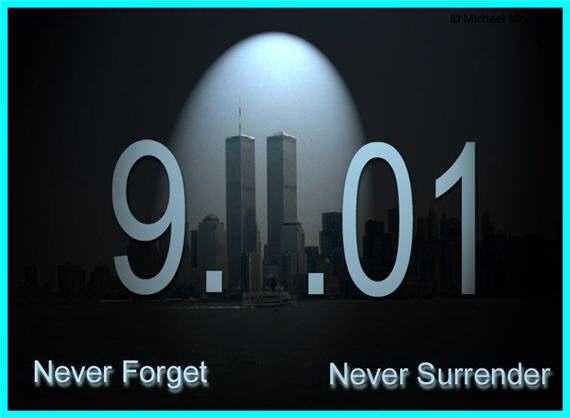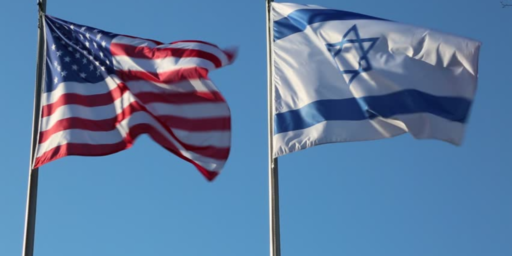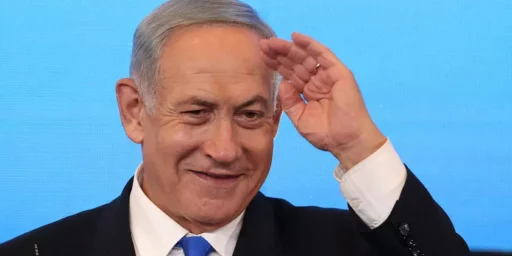No Football On 9/11?
Was it wrong for the NFL to schedule its opening Sunday on the anniversary of the September 11th attacks?
As I write this, the nation is still marking the events of September 11, 2001. The ceremonies at Ground Zero, the Pentagon, and Shanksville have ended (although the names of the dead will be read for the rest of the day) President Obama is on his way to the wreath-laying ceremonies at the Flight 93 National Memorial and the Pentagon, to be followed by an evening concert at the Kennedy Center. In a few hours, though, the nation’s attention will turn to the opening weekend of the National Football League, and official and unofficial Washington will spend the afternoon watching the Redskins face off against the New York Giants. Martin Krossel at FrumForum argues this morning, though, that there shouldn’t be any football at all today:
It’s often said that by changing our way of life because of the tragedy, we give the attacks’ perpetrators a post facto victory. To me this is a spurious argument. Nobody is suggesting that Americans permanently forsake celebration and entertainment. What I’m suggesting that on September 11th, and perhaps on one or two more days a year, American devote their time to reflect on their fortune of living in a free country and those who have lost their lives at the hands of those who would take away those freedoms.
Admittedly, some of my opposition to public entertainment on 9/11 comes from my traditional Jewish upbringing and my interest in Israel. The Jewish State sets aside a day for the commemoration of the Holocaust, Yom Hashoah. (Does anybody say that this commemoration is a victory for the Nazis?) Just a week later, on the eve of its national independence day, Israel holds a day of remembrance for its fallen soldiers. It has been customary for Israelis to visit the graves of fallen family members. Additionally, Tisha B’Av is a day on the Jewish calendar that has been set aside the destruction of two temples in Jerusalem, the loss of Jewish sovereignty, and all of the other calamities in Jewish history. On this day, religiously observant Jews abstain from all forms of “physical pleasure” — including eating.
In marked contrast, America has almost totally abandoned public grief. Some Americans still do celebrate Memorial Day, which was established as Decoration Day after the Civil War, by placing flags on soldiers’ graves and by attending services of remembrance in Washington and around the country. But for many more it’s a day picnics and going to the beach. Veterans Day, instituted on the anniversary of the Armistice that ended World War I, similarly, has lost much of its original meaning. Even if the solemnity of either or both of these days were somehow restored, it would still be appropriate to mark September 11 as a day of grief and reflection. 9/11 is not, as it is often called “this generation’s Pearl Harbor”. What happened ten years ago was qualitatively different than a military battle. Of course it’s tragic whenever one of our brave soldiers gets killed or badly wounded in battle. But, whether they enlist or get drafted, the men and women in the armed forces know that they will be forced to put their life on the line always exists. The passengers who boarded planes or went to work in the Twin Towers or the Pentagon had no expectation of losing their lives on 9/11. That adds another level of tragedy to their passing.
A few observations are in order, I think. First of all, while the September 11th attacks were a massive and horrible tragedy, they pale in comparison to the analogy that Krossel makes to the Holocaust, in which millions were exterminated in a deliberate years-long effort to destroy an entire group of people because of their religious and ethnic background. The Holocaust is an even that strikes a chord with all of humanity, and most especially with the Jewish people, for whom it was the culmination of nearly of a millennium of European anti-semitism. An event such as that seems to call out for a day of special remembrance. Secondly, I don’t think its unfair to say that Israel is a nation that has been living under more-or-less of a siege mentality since it became independent. In some sense, it isn’t surprising that a day to remember fallen soldiers, most of which have fallen in the past two generations, is treated differently than it is in the United States. Finally, I think it’s important to note the cultural differences between the United States and Israel. Jewish tradition is filled with holidays that mark one tragedy or another over the 5000-odd years of their history. Depending on how Orthodox one is, there are fasts spread throughout the year to mark the everything from the destruction of the First Temple to the Babylonian Captivity. Neither the Christian religious calendar nor the United States have such a tradition.
Krossel concludes:
A day long solemn commemoration of 9/11 might help reunite a badly fractured America and restore some of the flag-waving and boisterous patriotism that was so much evidence immediately after the attacks. Sure, in a world of 500 specialty cable channels, bringing the country together for collective grief would be much more difficult the only three existing networks all covered the Kennedy assassination.
It’s true that, in reaction to 9/11, many young Americans joined the Armed Forces to fight those who attacked us. However, can those Americans who would not even be willing to give up a day of football to commemorate 9/11 be depended on to defend their country’s freedom?
This strikes me as a totally unfair question. The fact that most Americans will spend their afternoon watching football says nothing about their willingness to defend their country or their patriotism, nor does it count as a callous way to mark the 10th anniversary of one of the saddest days in American history. Those of us who were alive and aware on September 11, 2001 will never forget that event, nor the uncertainty that existed for days afterward as we wondered what kind of brave new world we had been thrust into by a horrible act of inhuman violence. However, perpetual mourning is not the American way. Solemn observation of events such as this is entirely appropriate, of course, and necessary for the the survivors who were left behind. That doesn’t mean, though, that everything must stop in life because a certain date has been hit on the calendar.
Does Krossel also think all the stores should be closed so that we don’t sully this day with crass commercial activity? Does he think we should stay home and mourn in private, or are we obligated to go to a public ceremony? These are not things Americans do, at least not for an extended period of time. When a tragedy happens, the shock of the event forces us to stop, watch, and reflect. But then we move on, as we did after September 11th. Krossel seems to see it as a weakness, but I see it as a strength, and something that is just culturally American. Perhaps it’s something that goes back to pioneer days when, if someone died, you couldn’t simply stop worrying about the things you needed to do to survive. Whatever the cause, though, it’s something that seems to be part of the American psyche.
In a few days we’ll mark the 110th anniversary of the assassination of President William McKinley, the third President to be assassinated within a short 36 year period. Outside of a note in a news article somewhere, it will pass with very little notice. Even events like the anniversary of the Battle Of Antietam, the bloodiest single day in American history, will not be marked with the same kind of ceremony and media coverage that today’s 9/11-related events are receiving. And there’s absolutely nothing wrong with that. Ninety years from today, on September 11, 2101, we’ll mark the 100th anniversary of the September 11th attacks, and it’s not at all inconceivable that many of the people alive on that day will look at it with the same sort of historical detachment that we view a Civil War battle in Northern Maryland that resulted in the death of more than 3,500 people and injury to more than 17,000. As time goes on, the pain of this day will lessen as memory fades, and people will go on.
For today, though, I would submit that we’re remembering this day appropriately and that criticizing the NFL for scheduling games today, or the American people for watching them, is wildly out of place.







Concur. It was proper to cancel NFL games the weekend after the attacks, for reason of both propriety and logistics. But the notion that we should create some sort of shrine out of this day for all time is risible. Went don’t shut down for Pearl Harbor day, either.
It’s been years, and we still can’t get people to commemorate 9-11 with the proper amount of vigor? There oughta be a law….
Noted: Driving home this morning, a couple of guys were standing on an overpass waving at cars and holding big American flags. I tried to honk in time, but zooming by at 65 mph I’m not sure they heard.
Ten bucks says they’re going to watch football later. Also bet they’ll take their hat off for the national anthem, which every network will no doubt broadcast to mark the occasion.
We need to go on living our lives as normal as possible to show the attackers couldn’t change our way of life and to live in fear.
For your contemplation.
Sat Sep 11 2004-NFL 1 game…Sun Sep 11 2005-NFL 14 games…Mon Sep 11 2006-NFL 2 games…GO BEARS!
Ten years after Pearl Harbor it wasn’t commemorated as we’re commemorating 9/11.
The NFL should have played the Sunday after 9.11, propriety and logistics be damned. That was my first indication that the terrorists would win.
Terrorists want to cause terror. It’s right there in the name. And yet people want us to continue to amplify this terrorist attack in the name of patriotism.
Afterthought. April 19 2005…NBA 8 games…MLB 15 games…4/19/2005???…10 years after the terrorist bombing in Oklahoma City…the 168 victims of T. McVeigh are just as dead as those killed in NYC…RIP.
Not sure why we would want to do that. Waving the flag does not a great country make. Our forebearers actually did the often dangerous and backbreaking work that made America great. Keeping that going is not as simple as slapping a bumper sticker on your SUV. We actually need to roll our sleeves up and do the difficult day-to-day work. There is a reason greatness is not the norm in life, its actually kind of hard to obtain.
Let’s skip the search for short cuts. For example, when did we start having a rendition of “God Bless America” at baseball games – do we actually need two mandatory patriotic songs at a sporting event?
I’m afraid that horse has long since left the barn.
USA!!!!USA!!!!USA!!!!
http://packersnews.greenbaypressgazette.com/apps/pbcs.dll/gallery?Avis=U0&Dato=20110903&Kategori=GPG01&Lopenr=109030806&Ref=PH
@G.A.Phillips: Baseball, Hot Dogs, Apple Pie and Chevrolet!
The irony of the complaint is that if there were no football games today, less people would likely be as focused on the fact that it is 9/11 than would have been the case.
I have had the TV on for roughly 35 minutes now (half the Fox pregame and the National Anthem at Soldier Field) and a rather huge percentage of the focus has been on 9/11.
I would argue the fact that we are having football today means more, not less, national focus on the 9/11 anniversary.
Did Martin Krossel really compare 9/11 to the Holocaust?
Wow, speaking of poor taste…
I have never responded to responses to articles that I have written. But I must respond to some comments made by Doug Mataconis.
I did NOT mean to compare 9/11 to the Holocaust. Such a comparison could never enter my mind. The Holocaust is, and will always remain the greatest atrocity in human history. In my article on Frumforum, although not in the in the excerpts quoted by Mataconis, I mentioned that by mother, who is Canadian, was reluctant to doing to celebrate her 90th. birthday on this 9/11. My mother is a Holocaust survivor. In a few weeks, I will be with her at a Holocaust commemoration that she helps organize.
Still, most Americans would agree that 9-11 marks a national tragedy. My purpose in the article was not to comprehensively identify which events in American history should be so commemorated. My only purpose was to question whether it is appropriate to hold public celebrations, such as sports events, on such days.
@Martin Krossel:
Fair enough, then the answer to your question is … yes … it’s totally appropriate.
@anjin-san: You should be Cub fan. We sing “Take Me Out to the Ball Game” at the 7th inning stretch, not GBA.